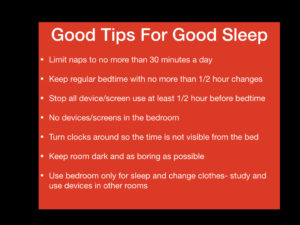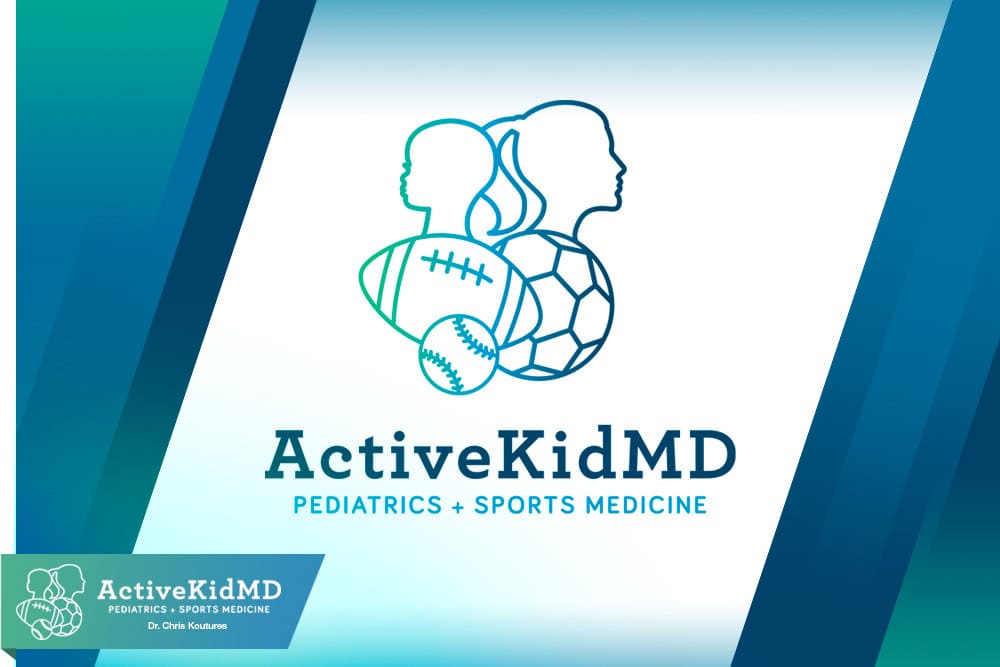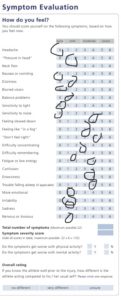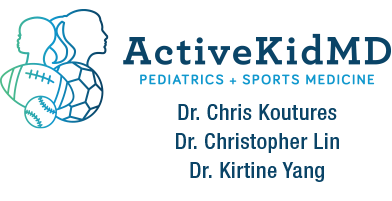There is no doubt that concussion sleep problems can make a difficult injury even more miserable.
Reports and experience find that poor sleep is linked with increased symptoms and longer recoveries.
Too much sleep that limits sensible daily activity can also slow recovery.
So, when dealing with concussion, I definitely ask about sleep.
Amount, quality, use of naps.
Probably good to start with defining a good target for amount of sleep?
For school-age individuals, especially the high school crowd, at least 8 hours a night is a great starting point.
Getting that amount of sleep has been shown to reduce the risk of future injury and illness.
Yes, I do realize we’re also dealing with young people who probably don’t have the best sleep patterns in general.
So, probably best to next review some key sleep hygiene tips that work for all kids- healthy or injured.

Keep those “normal” kid sleep goals and tips in mind as we now focus on concussion sleep problems.
From working with several concussed patients, have found particular sleep issues that occur early after injury, while others come up later.
We’ll introduce one more goal- balance– that will be the backbone of dealing with most concussion sleep problems.
Read on to learn more on how you can help strike a balance with concussion sleep problems.
Concussion Sleep Problems: The first few days
Right after injury, most patients feel downright horrible.
Headaches and tight necks, dizziness, trouble with lights and sounds- feels like the whole world got rocked.
Can’t find a comfortable position.
Sleep can be difficult due to the pain, or it comes easy as a release from the misery.
Common to hear concussed patients turn to acetaminophen (Tylenol) or ibuprofen (Advil/Motrin) and head for dark rooms.
Are those the best ideas?
No doubt some amount of rest is important after concussion, but like too little sleep, too much sleep can also actually slow recovery.
Striking a balance between too little and too much stimulation is the goal- short periods of low-risk activities can help the healing process.
As for the medications?
Again, it’s a balancing act.
While acetaminophen and ibuprofen can reduce headaches, using them too much or too long can increase the length and intensity of the pain.
Best to check with a medical professional about options- including some that can reduce headaches and increase night-time sleep (double bonus).
Related Content: Click here for more Tips on Dealing with Post-Concussion Headaches
Concussion Sleep Problems: A few weeks into recovery
The main reason I see sleep issues 2-3 weeks after concussion?
Boredom.
Being out of routine.
Part of concussion recovery includes adjustments in school, sport and social schedules.
Most of those modifications are intended to reduce overwhelming the healing brain.
But once again, too little stimulation can be a problem as well.
Kids who can’t do full school, or return to desired activities, tend to occupy their time with increased device use.
Too much screen time, especially with the blue light coming off screens, can make falling asleep difficult.
So, we often talk about that sleep hygiene, especially limiting screen use within a hour before bedtime.
I tend to see this typical symptom report about 2-3 weeks after injury.
Headache and neck pain better, less nausea- all good stuff- but fatigue, drowsiness, concentration and focus issues still big players.
This is patient calling for increased physical activity.
Take someone who was previously very active and totally shut them down- this is an absolute jolt to the system.
Studies and experience tell us that starting reasonable, low-risk exercise under appropriate medical supervision can make a huge positive impact.
After 2-3 weeks out, if I see a symptom report with several symptoms of high intensity-including poor sleep, I worry about the child who is trying to do too much.
Pushing through school, feeling crummy and taking too much time and effort to finish homework.
Doesn’t allow pain relief or sufficient sleep needed to start feeling better.
Time once again to strike that balance between symptoms and activity, while allowing for good quality and quantity of sleep.
Related content: How to Guide Return to School, Devices, TV, Homework and even Video Games after Concussion
Concussion Sleep Problems: 4-6 week after injury
At this point, I get more concerned about mental health issues such as depression or anxiety.
Those issues indeed can be found earlier in the recovery period.
Many patients definitely have mental health concerns even before getting hurt.
Thus, always ask about mood issues (and sleep as a measure of mood) at every visit.
For some reason, depression or anxiety symptoms tend to really come up around 4-6 weeks after injury.
In some patients, there will be difficulty getting that desired 8 hours- I tend to link that more with anxiety.
Others still are sleeping well over 8 hours, and especially might have issues getting up in the morning. The concern here might be more with depression.
Depression and anxiety can occur after a concussion, and there is no shame or weakness in discussing them.
Yes, review of good sleep hygiene, goals of balance in schedules, and appropriate physical activity are key at this stage.
Need to also ask the “hard” questions about dark thoughts including intent for self harm/harm to others.
Never hesitant to call upon mental health specialty colleagues to assist in the treatment and ensure personal safety.
Concussion Sleep Problems: Summary
- Appropriate sleep is essential in the recovery after concussion
- Don’t forget about using good sleep habits
- Balancing rest and level of activity is a key goal
- Always ask about mood
- Medical professionals who routinely deal with concussion patients can help with sleep and overall recovery
ActiveKidMD includes board-certified pediatrician Dr. Keith Gladstien and dual board-certified pediatric and sports medicine specialist Dr. Chris Koutures. ActiveKidMD offers an individualized approach to general pediatric and sports medicine care that enhances the health and knowledge of patients and their families in Orange County, California.



